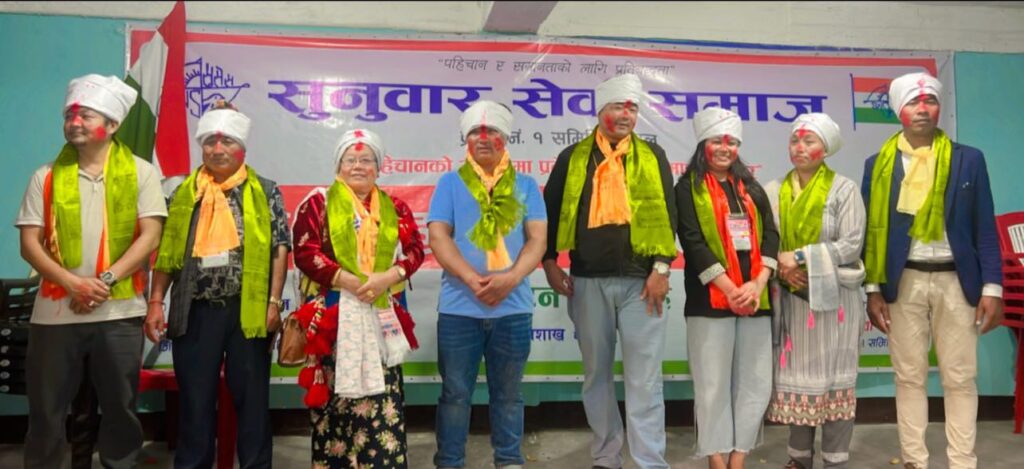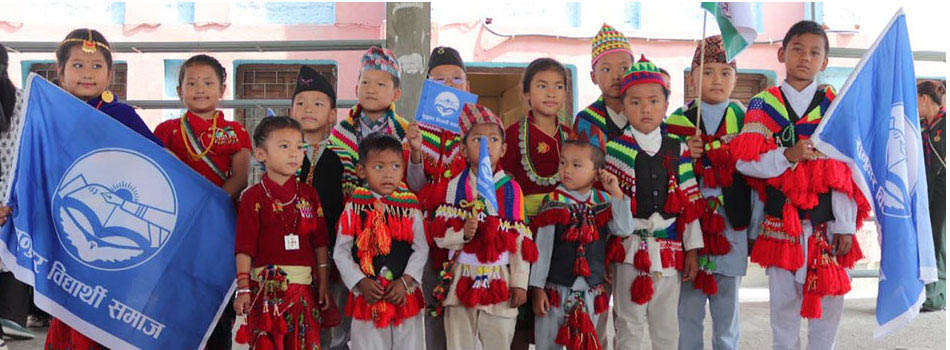प्रेस विज्ञप्ति

निःशुल्क लोकसेवा तयारी कक्षा सञ्चालन हुने सम्बन्धी अत्यन्त जरुरी सुचना !

हार्दिक बधाई एवम् शुभकामना

सुनुवार सेवा समाज जिल्ला समन्वय समिति उदयपुरको ७ औ सम्मेलनबाट चयन हुनुभएका नयाँ कार्यसमितिलाई हार्दिक बधाई एवम् शुभकामना ।
अध्यक्षः भिमराज सुनुवार
उपाध्यक्षः रुपमाया सुनुवार
सचिवः रोशन सुनुवार
कोषध्यक्षः हरिशसुनुवार
सदस्यः तिलक सुनुवार
सदस्यः दल ब.सुनुवार
सदस्यः निशा सुनुवार
हार्दिक बधाई एवम् शुभकामना

अध्यक्षः हेमन सुनुवार (सुनसरी)
उपाअध्यक्षः सन्त बहादुर सुनुवार (उदयपुर)
उपाअध्यक्षः विष्णुकला सुनुवार (भापा)
सचिवः चन्द्रदिप मुखिया सुनुवार (इलाम)
सहसचिवः निर्मल सुनुवार (अाेखलढंगा)
कोषाध्यक्ष अर्पना सुनुवार (सुनसरी)
सदस्यहरुः रुद सुनुवार (संखसभा), लक्ष्मी सुनुवार (माेरगं), सविना सुनुवार (इलाम)
भावपूर्ण श्रद्धाञ्जली


Sunuwar People
The Sunuwar (Nepali: , कोइँच, सुनुवार; Sunuwār Jāti) are an indigenous tribe originating in Nepal. They speak the Sunuwar language. According to the 2001 census of Nepal, 17% of the tribe follow the Kirant religion and adopt the Mundhum (Kiranti) culture.[1]
The Kiranti-Kõinchs number 55,752. The term ‘Kõinchs’ is also the name of the mother tongue. Other terms like Mukhiya or Mukhia are exonyms of the tribe. Sunuwar have their distinct language, religion, culture and social customs.[2]
They inhabit the eastern hills of Nepal and Himalayan. They are concentrated along the Molung Khola, Likhu Khola and Khimti Khola (‘Khola’ Indo-Aryan Nepali etymon ‘rivulet’) regions. By administrative division, they dwell in Okhaldhunga, Ramechhap and Dolakha districts of Nepal, politically known as Wallo (‘Near/Hither’), Kirant (in the past and also in use among the Kirantis at present) after the fall of the Kirant dynasty (ruling for about 1903 years and 8 months) at the ancient Nepal valley. Wallo Kirant in the past was their Kipat or communal land.
Lifestyle
Most Sunuwar practice agriculture (approximately 55%). They do so throughout the eastern hills of present-day Nepal. Crop cultivation and cattle farming (rice, millet, wheat, soybean, potato, and maize) are the main agricultural works. Sunuwar people also took part in the Second World War and were known as Gorkhali fighters, as well as honest. Some Sunuwar still join the Nepal Army, Indian Army, Singapore Police Force and British Army.
Traditional cultures
Sunuwar are very rich in culture and traditions. They have hundreds of traditional feasts and festivals with complex rituals and rules. Every traditional feast or festival has its own objectives, characteristics, and system of celebration. Some festivals, such as Chandi Dance in Baisakh Purnima, Sakela (Shyadar-Pidar), Gil puja (Gil-Pidar), and Meserani puja (Meserani-Pidar), are considered more important than others. They celebrate the Shyadar-pidar festival on the Day of Buddha Purnima, or after 5 days of Buddha Purnima(Panchami) according to the Nepali calendar. Sunuwar New year is celebrated on the day of Basanta Panchami. As a community, they celebrate Meserani Pidar twice a year, based on the Lunar Calendar.






